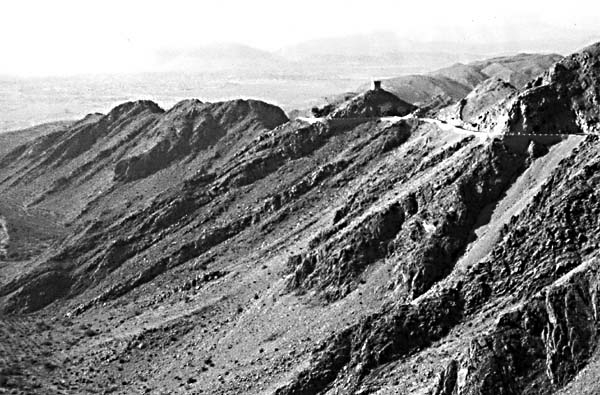

Khyber Pakhtunkhwa

The Northern Gateway
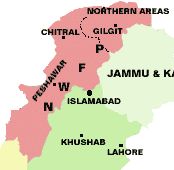 Khyber
Pakhtunkhwa (the erstwhile famous NWFP) is the frontier province of Pakistan located in the north west adjacent to
Punjab in the west, Balochistan in the south, northern areas in the north and shares a 1,100 km long border with Afghanistan to the west. Peshawar is its capital, and the Vale of Peshawar, fertile and well watered by the Kabul and Swat rivers, is its heart. This was also the heart of the ancient kingdom of Gandhara and is rich in archaeological remains. The northern half of the province consists of five river valleys running roughly parallel, north to south: the Chitral, Dir,
Swat, Indus and Kaghan. Northern Chitral and the upper regions of the Indus Valley are mountainous deserts, where cultivation depends entirely on irrigation. The
Khyber Pakhtunkhwa south of Peshawar is below the monsoon belt and consists of low, rocky mountains and wide, gravelly plains.
Khyber
Pakhtunkhwa (the erstwhile famous NWFP) is the frontier province of Pakistan located in the north west adjacent to
Punjab in the west, Balochistan in the south, northern areas in the north and shares a 1,100 km long border with Afghanistan to the west. Peshawar is its capital, and the Vale of Peshawar, fertile and well watered by the Kabul and Swat rivers, is its heart. This was also the heart of the ancient kingdom of Gandhara and is rich in archaeological remains. The northern half of the province consists of five river valleys running roughly parallel, north to south: the Chitral, Dir,
Swat, Indus and Kaghan. Northern Chitral and the upper regions of the Indus Valley are mountainous deserts, where cultivation depends entirely on irrigation. The
Khyber Pakhtunkhwa south of Peshawar is below the monsoon belt and consists of low, rocky mountains and wide, gravelly plains.
The warlike Pathans (or Pushtuns or Pukhtuns), who live in Khyber Pakhtunkhwa and the adjoining areas of Afghanistan, number about 17 million, making themselves a race apart, a chosen people. The Pathans are divided into numerous sub-tribes and clans, each defending its territory and honour.
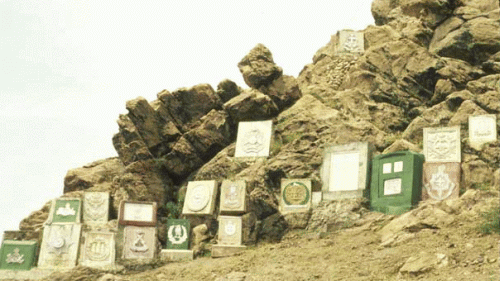
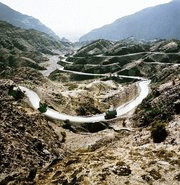
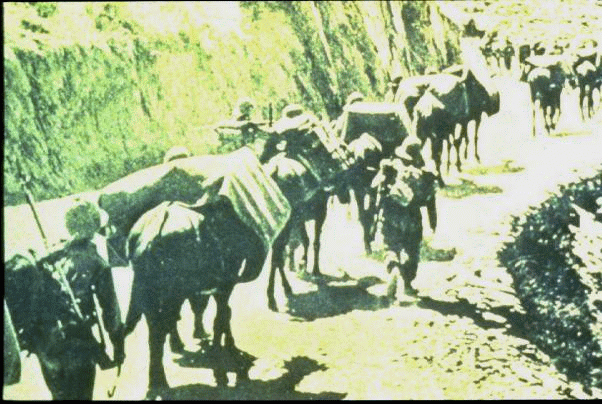
Khyber Pakhtunkhwa through its famous Khyber Pass (56 kilometres long, 40 kilometres being in Pakistan and the remainder in Afghanistan. From the Khyber border post at Torkham, where an old sign warns hitch-hikers that under no circumstances should they spend the night in the open in the Pass, it is a 55 kilometre journey to the city of Peshawar.) has been subjected to all northerly invasions from Alexander to Mahmud of Ghazna. Not until the powerful Kushans invaded Gandhara and pacified the area in the first century AD did the Khyber become a popular trade route. Sher Shah Suri, ran his Delhi-to-Kabul Shahi Road through the Khyber Pass.
The British left behind a number of mementos of their long stay in the Khyber. The road itself is the most enduring, while the weathered and faded insignia and crests of famous regiments carved into the walls of the Pass are eye catching. There is a railway too, dating back to the mid 1920s. The sight of the steam train which, once a week on Fridays, runs up from Peshawar to Landi Kotal, reinforces the sense that one has of the Khyber Pass being outside the normal processes of time. The train has an engine at either end-both were made in England in I931.
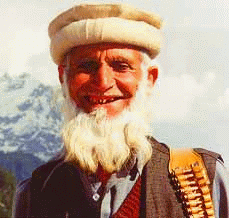
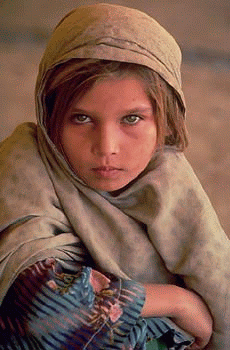
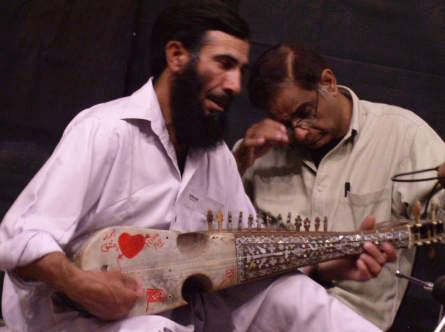
The Pathans (the majority people in Khyber Pakhtunkhwa) are stout, broadly built and clad in traditional baggy trousers and long loose shirts (Shalwar and Kameez) encounter guests with a firm hand-clasp and a straight but friendly look. They often wear bullet studded bandoleers across their chests or pistols at their sides more of a tradition and less of a display of armoury or show of power. They display their emotions too quickly, which may take an onlooker by surprise. On weddings and occasions of joy, salvos of gun fire are amusing. Rabab is their traditional stringed musical instrument, which adds rhythms to the beautiful Pashto poetry.
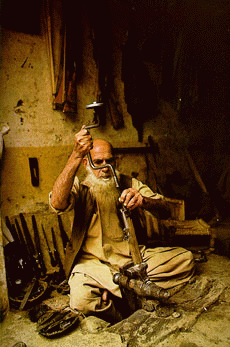
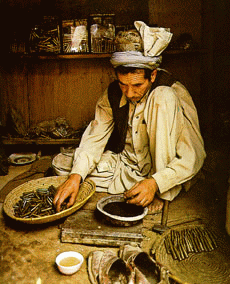
Darra Adam Khel in the tribal area near Kohat has been an ancient indigenous weapons manufacturing village since ages. Here one could find hand made fire arms from simple shot guns to automatic rifles and pistols. The arms manufacturing "factories" produced weapons which is considered to be the jewelry of Pathans of the tribal areas. Lately, the government of Pakistan has patronized these small factories for exporting the hand made weapons for those who love hunting with hand made classic guns. One only need to try these indigenous rifles to appreciate the craftsmanship of totally illiterate craftsmen.
In recent times, the province is embattled into a fierce War on Terror as the militants from adjoining war torn Afghanistan infiltrate from a largely porous border between Pakistan and Afghanistan. Now these militants have even started to threaten the law and order situation inside Pakistan. There have been hundreds of suicide bomb attacks by these very militants causing casualties in thousands. Pakistan Army has played a leading role in containing and defeating the militants and clearing out many cities that have fallen to the active influence of the militants.
In 2010, the name of the province was changed from the erstwhile NWFP (North Western Frontier Province - a name coined by the British) to Khyber Pakhtunkhwa. Protests arose among the local ethnic Hazara population due to this name change, as they began to demand their own province.
Besides the ill effects of war on terror, the province has been hit hard twice by severe natural calamities in the past five years. While it was still recovering from the after shocks of one of the most severe earthquakes of the world that left thousands dead in 2005, the flash floods in July-August 2010 have devastated not only Khyber Pakhtunkhwa but the entire Pakistan. Till updating this page, Pakistan and its people continue to face and brace the wrath of floods, unparallel in last 100 years.
|
Related Links: | NWFP | See More | Kyhber Pakhtunkhwa (Wikipedia) | Earthquake 2005 | Floods 2010 | |
|
| HOME PAGE | FATA | BALOCHISTAN | NORTHERN AREAS | PUNJAB | SIND | Copyright©JalalsPages - 2005 - 2010 |